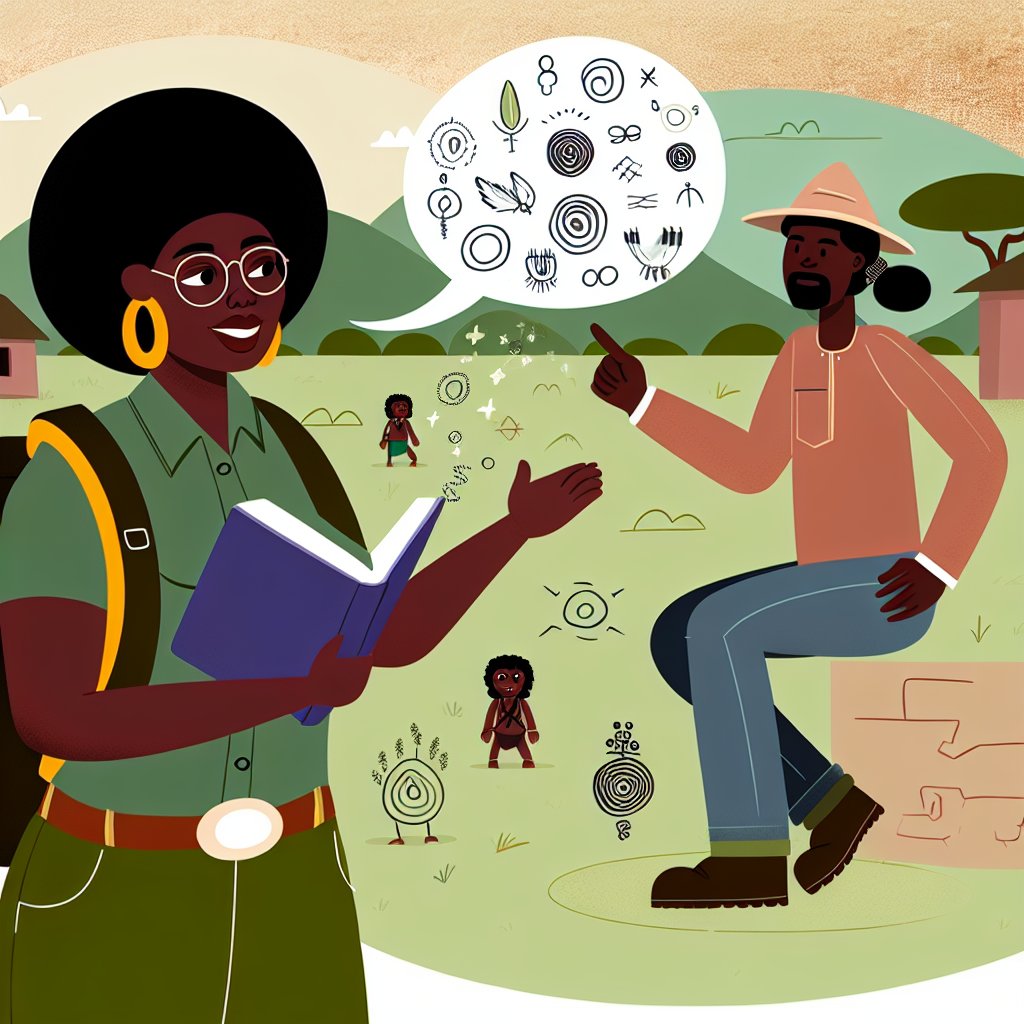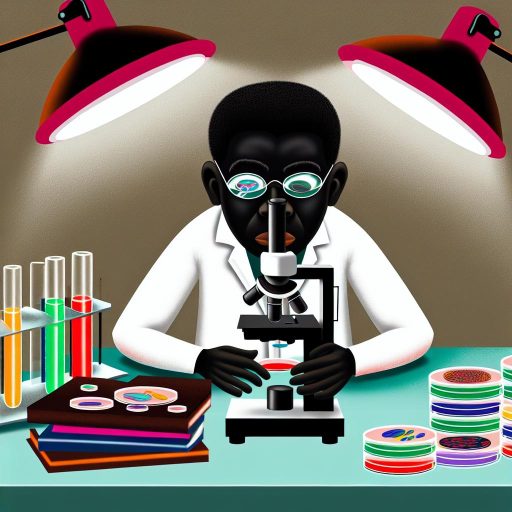Introduction
Anthropology is the study of human societies and cultures.
Nigerian Indigenous Knowledge Systems refer to the traditional knowledge and practices of the people of Nigeria.
Studying the relationship between anthropology and Nigerian indigenous knowledge systems is crucial for several reasons.
Firstly, it helps in preserving the rich cultural heritage of Nigeria.
Understanding the indigenous knowledge systems of Nigeria through an anthropological lens promotes cultural appreciation and respect among different communities.
By studying how anthropology intersects with Nigerian indigenous knowledge systems, researchers can gain valuable insights into social structures and belief systems.
Exploring this relationship also sheds light on how traditional practices impact contemporary Nigerian society, providing a deeper understanding of cultural dynamics.
Anthropologists can utilize their expertise to document and protect endangered aspects of Nigerian indigenous knowledge systems, ensuring their preservation for future generations.
Furthermore, studying this relationship fosters collaboration and mutual learning between anthropologists and Nigerian communities, promoting cultural exchange and understanding.
Overall, delving into the connection between anthropology and Nigerian indigenous knowledge systems is essential for celebrating diversity, promoting cultural tolerance, and preserving cultural heritage.
Overview of Nigerian Indigenous Knowledge Systems
Nigeria is a country with a rich cultural heritage and diverse ethnic groups.
With over 250 ethnic groups, Nigeria boasts a myriad of indigenous knowledge systems.
These knowledge systems are deeply rooted in the history, traditions, and practices of the various cultures.
Highlight of the Diverse Cultures and Ethnic Groups in Nigeria
Nigeria is home to diverse cultures such as the Yoruba, Hausa, Igbo, Fulani, and many more.
Each ethnic group in Nigeria has its own unique language, customs, and traditions.
These cultures have contributed to the rich tapestry of Nigerian indigenous knowledge systems.
Different Forms of Indigenous Knowledge in Nigeria
Traditional medicine: Nigerian indigenous knowledge includes traditional healing practices using herbs and natural remedies.
Music and dance: Nigerian cultures have vibrant music and dance forms that are passed down through generations.
Storytelling: Oral tradition is significant in Nigeria, with stories and folklore being used to pass down wisdom.
Nigerian indigenous knowledge systems are a vital part of the country’s cultural identity.
Through traditional medicine, music, dance, and storytelling, these knowledge systems continue to be preserved and passed down from generation to generation.
The diverse cultures and ethnic groups in Nigeria contribute to the richness and diversity of indigenous knowledge, making it an integral part of the nation’s heritage.
Anthropological Perspective on Nigerian Indigenous Knowledge Systems
Anthropologists study indigenous knowledge systems through fieldwork and interaction with local communities.
They analyze how this knowledge is transmitted, preserved, and applied in everyday life.
Anthropologists pay attention to the cultural context in which indigenous knowledge systems exist.
They document different aspects of indigenous knowledge, including traditional medical practices, agriculture techniques, and rituals.
Role of Anthropologists in Preserving and Promoting Indigenous Knowledge in Nigeria
Anthropologists play a crucial role in preserving indigenous knowledge by recording and documenting oral traditions.
They work with local communities to ensure that their knowledge is accurately represented and respected.
Anthropologists advocate for the recognition of indigenous knowledge in policy-making and development projects.
They collaborate with indigenous practitioners to promote the preservation and transmission of traditional knowledge.
Find Out More: Bioinformatics: Nigerian Contributions to Global Research
Case Studies of Nigerian Indigenous Knowledge Systems
Indigenous knowledge systems in Nigeria are rich and diverse.
They encompass various aspects of culture, tradition, and history.
Here are some examples of specific indigenous knowledge systems in Nigeria:
Yoruba Ifa Divination
- Ifa divination is a major indigenous knowledge system among the Yoruba people of Nigeria.
- It involves consulting Ifa priests who communicate with the Orishas through divination tools.
- The system provides guidance on various aspects of life, including health, relationships, and career.
- Yoruba Ifa divination is deeply rooted in the Yoruba cosmology and belief system.
Igbo Masquerade Traditions
- Masquerade traditions are an integral part of Igbo cultural heritage in Nigeria.
- Each masquerade represents a deity, ancestor, or spirit and plays a significant role in community rituals.
- These traditions are passed down through generations and hold spiritual and social importance.
Hausa Traditional Architecture
- Hausa traditional architecture showcases the unique building styles and designs of the Hausa people.
- These architectural practices are based on indigenous knowledge systems that have evolved over centuries.
- They reflect the cultural values, climate adaptation, and craftsmanship of the Hausa society.
These indigenous knowledge systems have a profound cultural significance and impact on Nigerian society:
- They preserve and transmit cultural heritage, values, and beliefs from one generation to another.
- They shape social structures, relationships, and interactions within communities.
- They provide a sense of identity, continuity, and connection to the past for Nigerians.
- They contribute to the sustainability, resilience, and adaptability of Nigerian societies.
Delve into the Subject: How to Prepare for a Zoology Degree in Nigeria
Challenges and Threats to Nigerian Indigenous Knowledge Systems
- Modernization
- Globalization
- Cultural appropriation
Nigerian indigenous knowledge systems face several challenges in the modern world.
The forces of modernization, globalization, and cultural appropriation pose significant threats to the preservation and transmission of traditional knowledge to future generations.
Addressing the Issues Faced by Indigenous Knowledge Systems in Nigeria
Modernization has led to rapid changes in lifestyle and values.
It causes a shift away from traditional practices and beliefs.
Transform Your Career with Expert Guidance
Get personalized mentorship consulting that’s tailored to your unique path. Our expert advice is actionable and exclusive.
Get StartedAs people adopt more Westernized ways of living, there is a risk of losing indigenous knowledge that has been passed down through generations.
Globalization, with its influence from Western cultures, has also played a role in undermining Nigerian indigenous knowledge systems.
The influx of foreign ideas and technologies has created a more homogenized global culture.
This diminishes the uniqueness of indigenous practices.
Cultural appropriation is another concern for Nigerian indigenous knowledge systems.
As traditional knowledge becomes popularized in mainstream culture, there is a risk of misrepresentation and exploitation.
This can lead to the commodification of indigenous practices, stripping them of their cultural significance.
Impact of Challenges on the Preservation and Transmission of Indigenous Knowledge
The challenges mentioned above have a detrimental impact on the preservation and transmission of Nigerian indigenous knowledge systems.
As traditional practices are marginalized in favor of modern ways of living, there is a risk of losing valuable cultural heritage.
With globalization making the world more interconnected, there is a danger of traditional knowledge being marginalized and overshadowed by dominant Western ideologies.
This can lead to a loss of identity and cultural erosion within indigenous communities.
Cultural appropriation further exacerbates the challenges faced by Nigerian indigenous knowledge systems.
When traditional practices are misrepresented or exploited for commercial gain, it undermines the integrity and authenticity of indigenous knowledge.
This makes it difficult to pass on to future generations.
Essential Measures for Protecting Indigenous Knowledge
Nigerian indigenous knowledge systems are under threat from various challenges such as modernization, globalization, and cultural appropriation.
Recognizing these issues is essential to take proactive steps to safeguard and promote traditional knowledge for the benefit of future generations.
Learn More: Sustainable Practices in Nigerian Agricultural Economics

Opportunities for Collaboration and Knowledge Exchange
Collaboration between anthropologists, indigenous communities, and governmental organizations presents a unique opportunity to preserve and promote Nigerian indigenous knowledge systems.
By working together, these stakeholders can leverage their respective expertise to ensure the protection and transmission of invaluable cultural traditions and practices.
Anthropologists bring their research skills and understanding of cultural dynamics to the table.
This allows them to document and analyze indigenous knowledge systems in a way that respects their complexity and significance.
They can work closely with indigenous communities to co-create initiatives that preserve traditional knowledge while adapting to contemporary challenges.
Indigenous communities, on the other hand, are the custodians of this knowledge, possessing deep insights into sustainable practices, medicinal remedies, agricultural techniques, and storytelling traditions.
These practices have been passed down through generations.
Their active participation in collaborative efforts ensures that their voices are heard and their perspectives are central to any initiatives aimed at safeguarding their knowledge.
Governmental organizations play a crucial role in providing support, resources, and legal frameworks to protect indigenous knowledge systems from exploitation and misappropriation.
By partnering with anthropologists and indigenous communities, governmental organizations can facilitate the creation of policies that recognize and respect cultural intellectual property rights.
Sharing indigenous knowledge with the wider world can have numerous benefits, including promoting cultural diversity, fostering cross-cultural understanding, and advancing sustainable development practices.
When traditional knowledge is shared ethically and respectfully, it can contribute to global conversations around environmental conservation, biodiversity preservation, and holistic wellbeing.
Respecting cultural intellectual property rights is paramount in any exchange of indigenous knowledge.
It is essential to acknowledge the source and ownership of traditional knowledge.
One must seek permission from the relevant communities before sharing or using their knowledge.
Additionally, one must ensure that any benefits derived from this knowledge are equitably distributed back to the communities that hold it.
Collaboration and knowledge exchange among anthropologists, indigenous communities, and governmental organizations offer a powerful tool for safeguarding and promoting Nigerian indigenous knowledge systems.
By recognizing the value of traditional knowledge and respecting cultural intellectual property rights, we can ensure the continued vitality and relevance of these rich cultural legacies for generations to come.
- Highlight the potential for collaboration between anthropologists, indigenous communities, and governmental organizations to safeguard and promote indigenous knowledge systems.
- Discuss the benefits of sharing indigenous knowledge with the wider world and the importance of respecting cultural intellectual property rights.
Gain More Insights: The Impact of Climate Change on Nigerian Archaeological Sites
Nigerian Indigenous Knowledge Systems and Cultural Heritage
The study of anthropology and Nigerian indigenous knowledge systems plays a crucial role in preserving cultural heritage.
Understanding the unique perspectives and practices of Nigerian communities contributes to the conservation of traditions and beliefs.
These traditions have been passed down for generations, highlighting their importance in identity and continuity.
Furthermore, studying these knowledge systems promotes intercultural understanding.
It sheds light on diverse ways of knowing and living.
This understanding helps bridge the gap between different cultures.
It fosters respect for and appreciation of the richness of human diversity.
Anthropology provides a lens to explore the complexities of Nigerian indigenous knowledge systems.
It is through this interdisciplinary approach that we can ensure the continued survival of these invaluable cultural treasures.




